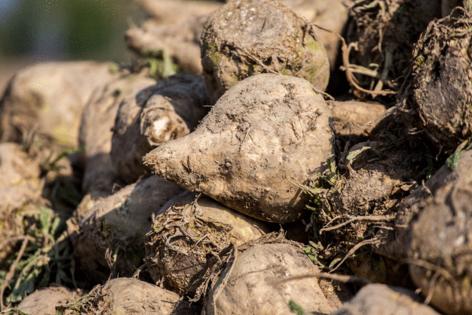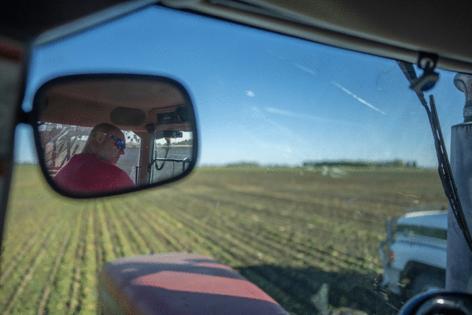MAHA is complicated for sugar beet country as its ideals collide with livelihoods
Published in Business News
WHEATON, Minnesota – Sitting in a pickup rolling up to a sugar beet field on the southern edge of the Red River Valley, farmer Jamie Beyer wants to talk MAHA.
But she doesn’t know if her neighbors do. At least not in the valley, where beet farms and sugar refineries dotting the landscape north to Canada are on the opposing side of Health and Human Services Secretary Robert F. Kennedy Jr.’s war on sugar.
“I think my friends are (succumbing) to some sort of political exhaustion,” Beyer said.
In the rural stretches of western Minnesota’s border with North Dakota, President Donald Trump won by big margins in 2024 and many are staunch supporters of his policies. But the momentum of his health czar Kennedy’s signature “Make America Healthy Again” philosophy — targeting production agriculture and America’s sweet tooth — has run into a stubborn wall of farming cooperatives invested in protecting both.
Harvests from the roughly 3,500 farms across the Red and Minnesota river valleys produce a third of the beet sugar in the U.S., resulting in 21,000 jobs and $3.1 billion for the state’s economy.
In April, Neil Rockstad, a beet farmer in Norman County, stood next to U.S. Agriculture Secretary Brooke Rollins at an American Crystal Sugar factory in Moorhead as she talked about the industry’s importance.
That same day, Kennedy made headlines by calling sugar poison.
“It was an interesting dynamic,” Rockstad, president of the American Sugarbeet Growers Association, said. “If the topic of MAHA comes up over coffee at church or something, we certainly talk about it.”
Beets are used to make more than half the sugar in the U.S., filling most baking cupboards and sweetening a majority of chocolate products.
And in small towns, beet farms — which began their annual harvests earlier this month — are interwoven with communities where Trump support is strong.
In Washington, HHS released a MAHA report on children’s health in September, attacking sugar for potentially driving diseases from childhood obesity to diabetes.
Simultaneously, the growth of weight-loss drugs has led to less demand in sugar, with beet sugar prices dropping 33% this year.
Both those factors put pressure on the industry at a time when farming costs are going up.
When livelihoods are at stake and political views are polarized, it’s harder to have nuanced conversations like the one Beyer wants to have over making the right food choices at grocery stores.
She’s talking about discussions like her husband, Rodd Beyer, had with their daughter after she came back from the store with what she said was a tub of ice cream.
He drove her back to the store for a chemistry lesson.
“This was not ice cream,” he said. She’d purchased a “frozen dessert,” with ingredients few can pronounce.
The Beyers and other farmers say many people equate sugar with that set of preservatives and dyes in packaged food, launching what they feel is an unfair backlash.
“When people think they don’t want sugar in their foods, they’ll add 20 different things because it tastes bad without sugar,” Rodd Beyer said. “It’s all this junk.”
But the politics of food gets in the way of actual discussions about healthy eating and the types of choices people make, Jamie Beyer said.
Nutrition experts have long sounded the alarm on sugar-saturated diets for children. In a response to the MAHA report, the Harvard T.H. Chan School of Public Health concurred with broad findings but faulted the report for not going further in analyzing underlying factors driving childhood disease and illness, including poverty, firearms and sugar-sweetened beverages.
Recent polling from the University of Illinois shows around 50% of Americans hold a positive view of MAHA, with the Trump administration tapping into social media influencers espousing the dangers of color dyes, added sugars and vaccines in children.
If the Trump administration moves forward on the report’s recommendations, it will further test the complicated loyalties of farmers, who have largely supported Trump at the ballot box while sometimes holding their noses at his farm policies — from tariffs to immigration raids at meatpacking plants, industry experts said.
Many beet farmers also plant soybeans, which are caught in the Trump administration’s trade war with China, so they have pressure on two major parts of their businesses.
It’s not the first time policies had unintended consequences on farmers. A generation ago, First Lady Michelle Obama drew criticism for overhauling school lunches.
Now, some say Kennedy’s attempts to remake the American food system could be similarly esoteric and end up hurting those it wants to help.
Cheryal Hills, who oversees the North Central Regional Food Business Center in Brainerd, saw portions of a $15 million grant to connect small farms with markets clawed back earlier this year.
That move cut off the fresh food MAHA supports at the same time it hurt local farmers, Hills said.
“There’s nowhere to fact-check exactly how much damage is really happening to small farmers,” she said.
Before the fall harvest, the beet lobby, respected in Washington, had produced wins. When Trump and the Republicans in Congress passed the federal budget act in July, the legislation contained an increase on the loan rate for sugar farmers.
But the drop in demand — partly fueled by the promotion of MAHA — has started having effects.
Tim Deal, a sugar beet farmer from Doran, Minn., submitted testimony to the U.S. Senate Agriculture Committee earlier this year, explaining how some farm cooperative members have sold shares as values have plummeted.
“It’s an unwelcome shock for any farmer to hear our crops compared to poison and illegal drugs,” Deal told Successful Farming in June.
For the Beyers, who farm 3,500 acres on both sides of the Minnesota-South Dakota border, they compare it to the unpredictable nature of any presidential administration. For instance, Joe Biden’s Environmental Protection Agency urged farmers to alter landscapes to protect endangered species, which was, Jamie Beyer said, “unworkable.”
“It could go really good or really bad,” she said. “You just don’t know.”
©2025 The Minnesota Star Tribune. Visit at startribune.com. Distributed by Tribune Content Agency, LLC.















Comments